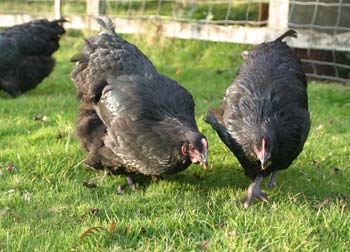We have all heard of the phrase “the pecking order”. Chickens establish a hierarchial order in their flock. This is thought to have evolved over many thousands of years in the jungle fowl of South East Asia. The pecking order allowed the flock to eat in turn and peacefully when food was available. If they were fighting at these times, they would be wasting their opportunity to eat and attracting attention to themselves from predators.
The pecking order is still well and truly with the hens of today and hens can be incredibly cruel to newcomers. If you are mixing hens that aren’t used to one another, you should make sure you are around to keep an eye open for trouble. The following points may help:
- Place newcomers behind a fence or in a small run for a week so that they can get used to their new surroundings and get used to one another.
- Introduce a new hen at night to the coop when it is dark. Place her amongst the other hens. They will not fight in the dark and it will give the others a chance to get used to the new smell.
- If pecking takes place, leave them to get on with it as much as you can. They have to establish the new pecking order but…
- If blood is drawn at any point, remove the hen and try again when the injury has healed. Chickens are attracted to red and will peck blood very quickly.
- You may want to try removing the hen that is fighting with the newcomer to the flock for a little while until the new hen has settled into the flock, then put the trouble maker back in.
If you are still having difficulty with the hens getting along, you can try an Anti-peck spray and if you have real problems, ‘bumpa bits‘ can be fitted to the beak for a while. These stop the end of the beak closing completely so prevent her from causing damage to other hens but she is still able to eat and drink normally.






Hello – we haven’t introduced a new hen but we got two chickens about two weeks ago. They were from the same supplier and had been in a pen with 2 other birds all of the same age, about 18 weeks before coming to us. initially the slightly larger hen gave the other a quick pen now and again but this has escalated to quite vicious attacks resulting in the loss of all the bum feathers and some bleeding in the space of the last day or two. Is this jealousy because the smaller of the two is laying? Because of the blood we have enclosed the smaller one in the house today and the other is in the run. What can we do? Many thanks, alex
I would remove the bully for a while, let the other hen recover from her wounds and then re-introduce in a large area, placing them in the coop together at night. Give them more than one place to feed and lots of ‘other things’ to do from hanging greens to treats / corn scattered over a large area and so on, then see how it goes. After a couple of weeks, there should be normality although occasionally I’ve heard of a hen that just will not give up bullying. In this case, I would resort to anti-peck sprays and also ‘bumper bits’ (available from Omlet) as a short term measure which fit to the beak and stop the pecking.
I need some help please. I had 3 hens of various hybrid breeds. One died last week. Tried to introduce 2 new hens and the noise that one of the old ones made was dreadful. Squawking very loudly. Managed a couple of hrs in the coop at bed time making no noise but suddenly started at 1 am!! With neighbours close by I had to remove the new ones overnight. Segregated part of the main run the following day but both old hens then started the very loud squawking. How long can this go on for? Can I do anything to stop the older ones making such a racket? Any tips would be appreciated. At the moment the new ones have gone to a friends home/ garden while I re think the introduction process.
She’s very stressed. I would try keeping them at a distance first and then gradually bring them together. Introductions can take a couple of weeks.
Thank you. I think I’ve learnt a very valuable lesson. Do your homework first! We will try again in a few days but very differently.
Thank you for your advice. We tried separating our two for three days and then reintroduced the bully with some additional food toys but the bully started again. So we separated again. This time I will try for a week but the bullied bird has now stopped eating at all and seems to pine for the other always going to the end of the run where she is closest to the coop/run of the other. We have bought some anti-peck – I’ve heard of varying degrees of success and will certainly get hold of some of the bumper bits. I was concerned that the anti-peck spray might sting spraying it on to bare skin but it sounds like the feathers will take a very long time to come back.
Hi i had 2 chickens until a couple of days ago where my poorly one died, my other chuck is happy at the moment but I don’t have lots of time to spend with her atm and was wanting to get 3 more to go with her for company however she is a very bossy girl ( she thinks she’s a cock), I’m worried that she might hurt them but also that they may harm her she’s around 5 now and part of the family but I can’t bear her being on her own all the time as she loves attention and company (very protective when her friend was poorly chasing of pigeons and sitting next to her.) Is there any tips other than introducing them at night. I can put them in separate runs but wouldn’t b able to with sleeping. Would i be able to add a different breed or would same breed be best also would they be best being similar colours?? Thank you in advanced. Btw fantastic site you should be proud!
It’s hard to tell – some hens that you think are going to be the boss turn out to be low in the pecking order, you never know for sure until you do the introduction.
During the day, you could divide the run in two with a bit of spare wire and feed them next to one another. A cat carrier or cardboard box could be used for egg laying. At night, you can put them together. When it’s dark, there will be no bullying and they will be getting used to the smell of the other hens near.
You can add different breeds – just keep them the same size. Young POL hens can sometimes be a little smaller so the introduction period in runs next to one another gives the newbies a chance to settle and grow a little more for a week or two. The same colour birds can help – but depends on her experiences. Birds brought up in a mixed flock are more tolerant.
Hello
I’ve recently bought 4 bantam chickens hopefully all hens. 2 are 8 weeks old and 2 are 4weeks old. I’ve had them for about 2 weeks now and every time I try and put then together the older chickens pic on the younger 2. They have always been separted because the younger chicks were to small to go outside at night and they are now still sleeping in a box in my kitchen. Are the 4 week old chicks old enough to go out side at night now? I let all the chickens out to roam around the garden together in the day but there is a lot of bullying and I have to intervene at times. Is think something that will resolve when they are bigger? Will have to wait until they are bigger to mix them?
Thank you for your help I’ve found this website very useful beginning new to keeping chickens.
Levi
Firstly, the 4 week old chicks should still be under heat. Until they are fully feathered at about 5 weeks, they can’t regulate their body temperature correctly and need additional heat when it gets cooler at night. Saying that, if you have them indoors and they have one-another for warmth then they will usually be able to huddle up for warmth.
It’s not a good idea to mix chicks of different ages due to bullying (mainly thanks to differences in size). This will cause stress, slower growth, difficulty for them to eat and drink and often disease strikes stressed birds. Their immune systems aren’t as developed either so the younger chicks are more likely to become sick.
Once they are all older, around 15-20 weeks, you might want to introduce them then. Once they are happy, introduce them as a group to older hens only when fully grown (18-25 weeks depending on the breed). This allows them to fend for themselves and again prevents them picking up disease from hens that can be carriers without showing symptoms. It takes time for chickens to acquire immunity to some diseases.